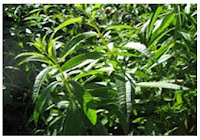What is Fenugreek?
 Fenugreek,
Trigonella foenum-graecum L., is an erect annual herb native to southern Europe
and Asia. Undoubtedly one of the oldest cultivated medicinal plants, fenugreek
is widely grown today in the Mediterranean countries, Argentina, France, India,
North Africa, and the United States as a food, condiment, medicinal, dye, and
forage plant (11.1-128). The plant reaches a height of 0.3 to 0.8 meters and
has trifoliate leaves. White flowers appear in early summer and develop into
long, slender, yellow-brown pods containing the brown seeds of fenugreek
commerce.
Fenugreek,
Trigonella foenum-graecum L., is an erect annual herb native to southern Europe
and Asia. Undoubtedly one of the oldest cultivated medicinal plants, fenugreek
is widely grown today in the Mediterranean countries, Argentina, France, India,
North Africa, and the United States as a food, condiment, medicinal, dye, and
forage plant (11.1-128). The plant reaches a height of 0.3 to 0.8 meters and
has trifoliate leaves. White flowers appear in early summer and develop into
long, slender, yellow-brown pods containing the brown seeds of fenugreek
commerce.
Fenugreek and Breastfeeding
 Fenugreek
seeds contain hormone precursors that increase milk supply. Scientists do not
know for sure how this happens. Some believe it is possible because breasts are
modified sweat glands, and fenugreek stimulates sweat production. It has been
found that fenugreek can increase a nursing mother's milk supply within 24 to
72 hours after first taking the herb. Once an adequate level of milk production
is
reached, most women can discontinue the fenugreek and maintain the milk supply
with adequate breast stimulation. Many women today take fenugreek in a pill
form (ground seeds placed in capsules). The pills can be found at most vitamin
and nutrition stores and at many supermarkets and natural foods stores.
Fenugreek can also be taken in tea form, although tea is believed to be less
potent than the pills and the tea comes with a bitter taste that can be hard to
stomach. Fenugreek is not right for everyone. The herb has caused aggravated
asthma symptoms in some women and has lowered blood glucose levels in some
women with diabetes.
Fenugreek
seeds contain hormone precursors that increase milk supply. Scientists do not
know for sure how this happens. Some believe it is possible because breasts are
modified sweat glands, and fenugreek stimulates sweat production. It has been
found that fenugreek can increase a nursing mother's milk supply within 24 to
72 hours after first taking the herb. Once an adequate level of milk production
is
reached, most women can discontinue the fenugreek and maintain the milk supply
with adequate breast stimulation. Many women today take fenugreek in a pill
form (ground seeds placed in capsules). The pills can be found at most vitamin
and nutrition stores and at many supermarkets and natural foods stores.
Fenugreek can also be taken in tea form, although tea is believed to be less
potent than the pills and the tea comes with a bitter taste that can be hard to
stomach. Fenugreek is not right for everyone. The herb has caused aggravated
asthma symptoms in some women and has lowered blood glucose levels in some
women with diabetes.
Aucun commentaire:
Enregistrer un commentaire